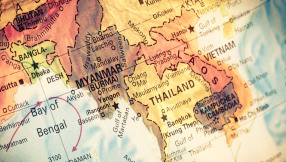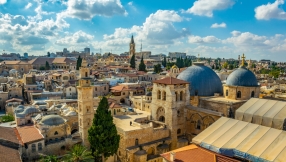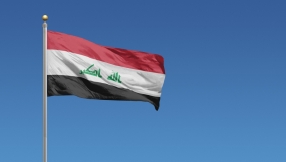Life for Christians in the Middle East today has been hugely impacted by war. Parts of the region have been emptied of Christians entirely. In other places, they are clinging on, reduced in number and deeply insecure. There's nowhere that hasn't felt the effects of conflict, whether directly as armies and militias have fought through their homes and villages, or indirectly as refugees and internally displaced persons have crowded into camps offering food and shelter – no matter how inadequate these often are.
But the story across the region is far more complex than is often told. While in some places Christians are harried and persecuted, in others they are able to minister to those in need. Over-simplifying a complicated landscape is a besetting sin of the West, with consequences that will last for generations.
Michel Constantin is regional director of the Catholic Near East Welfare Association/Pontifical Mission, overseeing programmes in Lebanon, Syria, Iraq and Egypt from his base in Beirut. Now 55, he's lived in Lebanon all his life and is intimately acquainted with the life of Christians in the Middle East through CNEWA/PM's mission to build up the church, alleviate poverty and inspire hope. On a recent visit to the UK with Embrace the Middle East, he tells Christian Today that Christians there need security, they need someone to speak for them in the corridors of power, and they need people there alongside them during the long road to recovery.
He speaks of Iraq, where 'Christians are considered a defeated people.' Regarded as supporters of the Saddam Hussein regime, many of them have been displaced multiple times, from Basra, to Nineveh, to Erbil, to Nineveh again.
From nearly 1.5 million in 2004, the Christian population is down to less than 300,000 now. 'The result is that they are diminishing in political presence and weight, they are getting lighter and lighter,' says Constantin. 'It was their dream 10 years ago that they could ask for an autonomous province in the Nineveh Valley. But now they're a minority even there. They are getting weaker and weaker.
'The people I meet would all like to leave Iraq.'
He stresses that CNEWA/PM, like other Christian organisations, wants to 'accompany them and respect their choices, and try to improve the quality of the services for them'. But, he says: 'I am very pessimistic about any large-scale return. The society is corrupted and divided among Muslim communities and ethnic communities – these are deadly conflicts and Christians are a very small minority, and can't change anything. It is not an equal contest.'
In Syria, beginning to see an end to another ruinous war, the situation is different.
'Christians have suffered the consequences of the war, but they didn't have to leave their homes or their churches – no one took their homes or their properties,' Constantin says. 'The war is very harsh, many left for Lebanon, France or Europe. But the regime is the winner. Christians were never against the regime.' For the most part, he says, Christians – like everyone else – suffer from the quality of services and the shattering of the economy.
'There are 5-6 million Syrians outside Syria. The most qualified people left, it's hard to return.
'I think it will be a long process, reconstruction – not one night. And the international fundraising fatigue makes the misery longer.
'In Syria, we try to give hope to those who remain, and improve the quality of their lives – with electrictity, medical facilities and supplies. Sixty per cent of the hospitals in Syria are out of business.'
Fear, poverty, the sheer difficulty of life with a collapsed infrastructure and the lack of any clear hope of a future have driven the refugee outflow. In Lebanon and Jordan, the number of refugees is almost half the population.
Constantin's own country of Lebanon has responded to the flood of refugees with extraordinary generosity. 'It is a very small country with a very small economy,' he says. Usually Lebanese people emigrate from Lebanon to the West – around 4 million Lebanese live there, but there are 17 million outside the country, 7 million of them in Brazil. And yet it has 2 million refugees, including many from Syria. 'The burden is very heavy. The local infrastructure is in bad shape from the civil war – we don't have electricity, water, sewage.
'The Syria war is why the situation is so unfortunate. Refugees are not in regular camps. They are in every village – there are 36,000 refugee settlements, with people living in tents.'
Unregulated and undocumented, he says, 'They are competing for work with poor Lebanese people. Wages are going down.'
While each country has been impacted by deadly and destructive conflicts, each bears the weight of its own history and faces its own political and social challenges – and this, too, is an issue for Christians, because it makes it very difficult to speak with a unified voice. As Constantin says: 'The West has fragmented over doctrine and theology. In the East it is over political issues.' And such is the force of identity politics in the region, he says, 'Even if there was one voice, they would hardly be heard.'
In Iraq, the extremist vision of an East without Christians has already come to pass. And Constantin stresses that this is a tragedy not just for Christians, but for the world.
The Church in the Middle East is very different from Europe. The churches are not only religious, they are also the guardians of civilisations,' he says. The ancient Syriac language is preserved in the church; Assyrians and Chaldeans still form living communities in Iraq; in Egypt, it is the Christian Copts that are the link to the Pharaonic past.
'The Middle East without Christians would be much poorer,' Constantin says. Minorities – Christians everywhere, Yazidis in Iraq, Druze, Shia Muslims in Egypt all need protection if they are to flourish. And hence his call for aid: Christians need 'someone to talk for them', representation in places where the decisions are made that will affect them; they need practical help of the kind CNEWA/PM helps to deliver, 'to be accompanied in their daily lives, to improve their lives – and long-term help, not just help to cover an immediate emergency. And with other minorities, in many places they need protection. 'There is no umbrella for the Christians in Iraq, or for any of the minorities. There is no protection against aggression, there are no observers.'
The vision of a Middle East depopulated of Christians is a bleak one. But it is not the whole story. Constantin and people like him are working to support those who remain, to strengthen them in their life and witness on the front line of faith.











